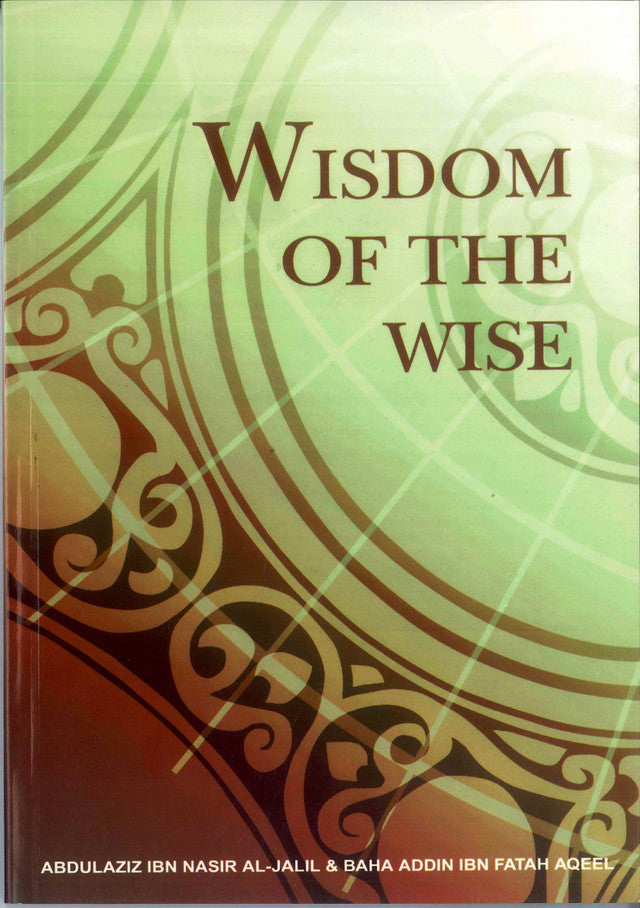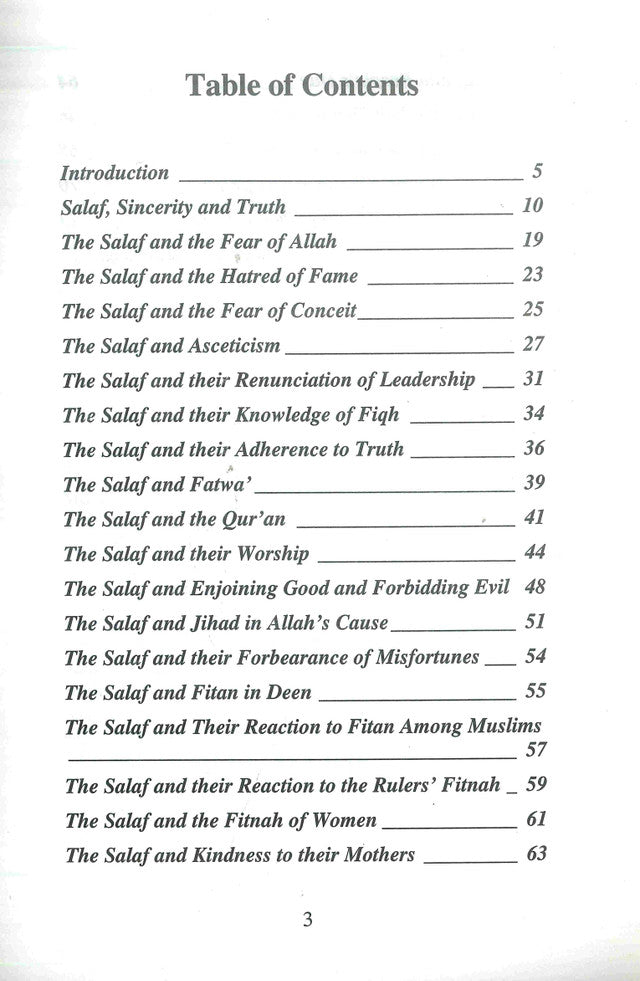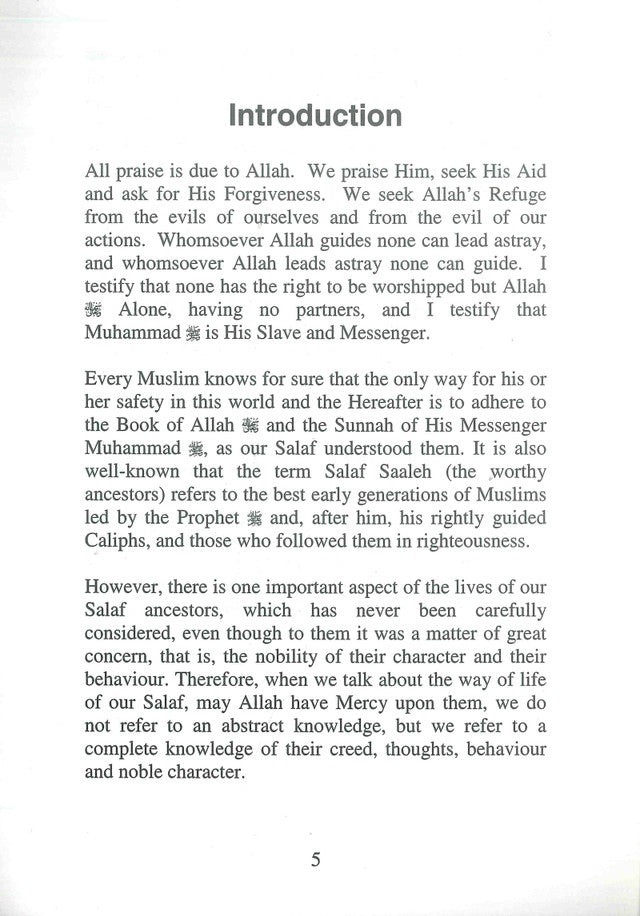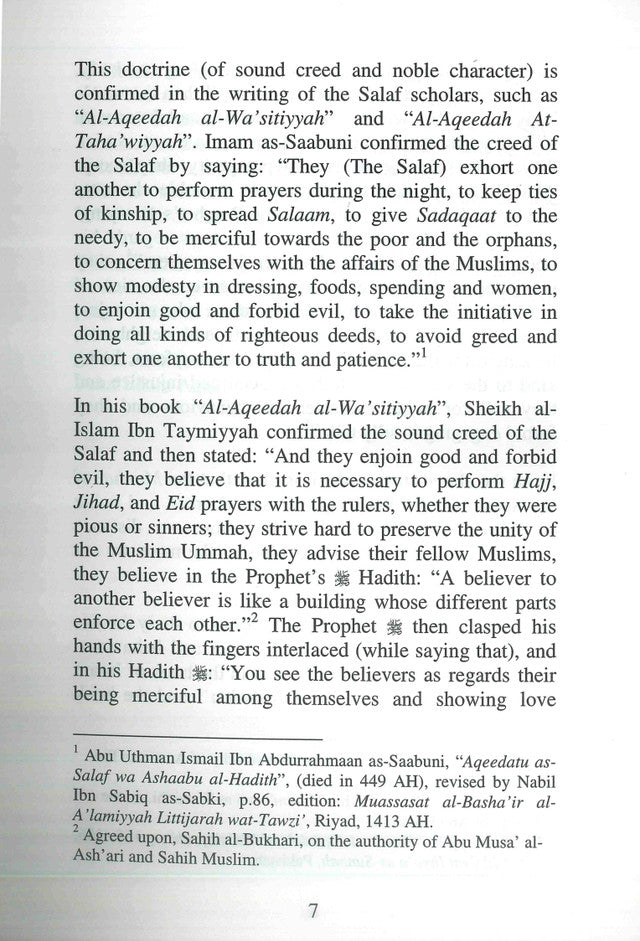Wisdom of the Wise |Abdul Aziz Nasir Al-Jalil
Wisdom of the Wise |Abdul Aziz Nasir Al-Jalil
Publisher:
Al Firdous LTD
Language:
English
Binding:
Soft Cover
Pages: 78
Size: A5 |5.8 x 8.3 in| 14.8x 21 cm
Couldn't load pickup availability




Collapsible content
Description of Book
Publisher
Al Firdous LTD
Author
Sample Pages - Content
Page:01WISDOM OF THE WISE ABDULAZIZ IBN NASIR AL-JALIL & BAHA ADDIN IBN FATAH AQEELPage:02Table of Contents Introduction Salaf, Sincerity and Truth The Salaf and the Fear of Allah 5 10 19 The Salaf and the Hatred of Fame 23 The Salaf and the Fear of Conceit 25 The Salaf and Asceticism, 27 The Salaf and their Renunciation of Leadership 31 The Salaf and their Knowledge of Figh 34 The Salaf and their Adherence to Truth 36 The Salaf and Fatwa' 39 The Salaf and the Qur'an 41 The Salaf and their Worship 44 The Salaf and Enjoining Good and Forbidding Evil 48 The Salaf and Jihad in Allah's Cause. 51 The Salaf and their Forbearance of Misfortunes. 54 The Salaf and Fitan in Deen 55 The Salaf and Their Reaction to Fitan Among Muslims 57 The Salaf and their Reaction to the Rulers' Fitnah 59 The Salaf and the Fitnah of Women 61 The Salaf and Kindness to their Mothers 63 3Page:03Introduction All praise is due to Allah. We praise Him, seek His Aid and ask for His Forgiveness. We seek Allah's Refuge from the evils of ourselves and from the evil of our actions. Whomsoever Allah guides none can lead astray, and whomsoever Allah leads astray none can guide. I testify that none has the right to be worshipped but Allah Alone, having no partners, and I testify that Muhammad is His Slave and Messenger. Every Muslim knows for sure that the only way for his or her safety in this world and the Hereafter is to adhere to the Book of Allah and the Sunnah of His Messenger Muhammad, as our Salaf understood them. It is also well-known that the term Salaf Saaleh (the worthy ancestors) refers to the best early generations of Muslims led by the Prophet and, after him, his rightly guided Caliphs, and those who followed them in righteousness. However, there is one important aspect of the lives of our Salaf ancestors, which has never been carefully considered, even though to them it was a matter of great concern, that is, the nobility of their character and their behaviour. Therefore, when we talk about the way of life of our Salaf, may Allah have Mercy upon them, we do not refer to an abstract knowledge, but we refer to a complete knowledge of their creed, thoughts, behaviour and noble character. 5Page:04This doctrine (of sound creed and noble character) is confirmed in the writing of the Salaf scholars, such as "Al-Aqeedah al-Wa'sitiyyah" and "Al-Aqeedah At- Taha'wiyyah". Imam as-Saabuni confirmed the creed of the Salaf by saying: "They (The Salaf) exhort one another to perform prayers during the night, to keep ties of kinship, to spread Salaam, to give Sadaqaat to the needy, to be merciful towards the poor and the orphans, to concern themselves with the affairs of the Muslims, to show modesty in dressing, foods, spending and women, to enjoin good and forbid evil, to take the initiative in doing all kinds of righteous deeds, to avoid greed and exhort one another to truth and patience."l In his book "Al-Aqeedah al-Wa'sitiyyah", Sheikh al- Islam Ibn Taymiyyah confirmed the sound creed of the Salaf and then stated: "And they enjoin good and forbid evil, they believe that it is necessary to perform Hajj, Jihad, and Eid prayers with the rulers, whether they were pious or sinners; they strive hard to preserve the unity of the Muslim Ummah, they advise their fellow Muslims, they believe in the Prophet's Hadith: "A believer to another believer is like a building whose different parts enforce each other."2 The Prophet then clasped his hands with the fingers interlaced (while saying that), and in his Hadith: "You see the believers as regards their being merciful among themselves and showing love 1 Abu Uthman Ismail Ibn Abdurrahmaan as-Saabuni, "Aqeedatu as- Salaf wa Ashaabu al-Hadith", (died in 449 AH), revised by Nabil Ibn Sabiq as-Sabki, p.86, edition: Muassasat al-Basha'ir al- A'lamiyyah Littijarah wat-Tawzi', Riyad, 1413 AH. 2 Agreed upon, Sahih al-Bukhari, on the authority of Abu Musa' al- Ash'ari and Sahih Muslim. 7
Who is Abdul Aziz Nasir Al-Jalil?
Abdul Aziz Nasir Al-Jalil is a name that doesn't immediately correspond to a widely recognized historical or public figure based on readily available information. It's possible that he could be a private individual, a professional, or a local figure, or the name may be spelled differently or less publicly known. Could you provide more context or specify the area you're referring to (e.g., politics, business, academia)? That might help me assist you more accurately!




